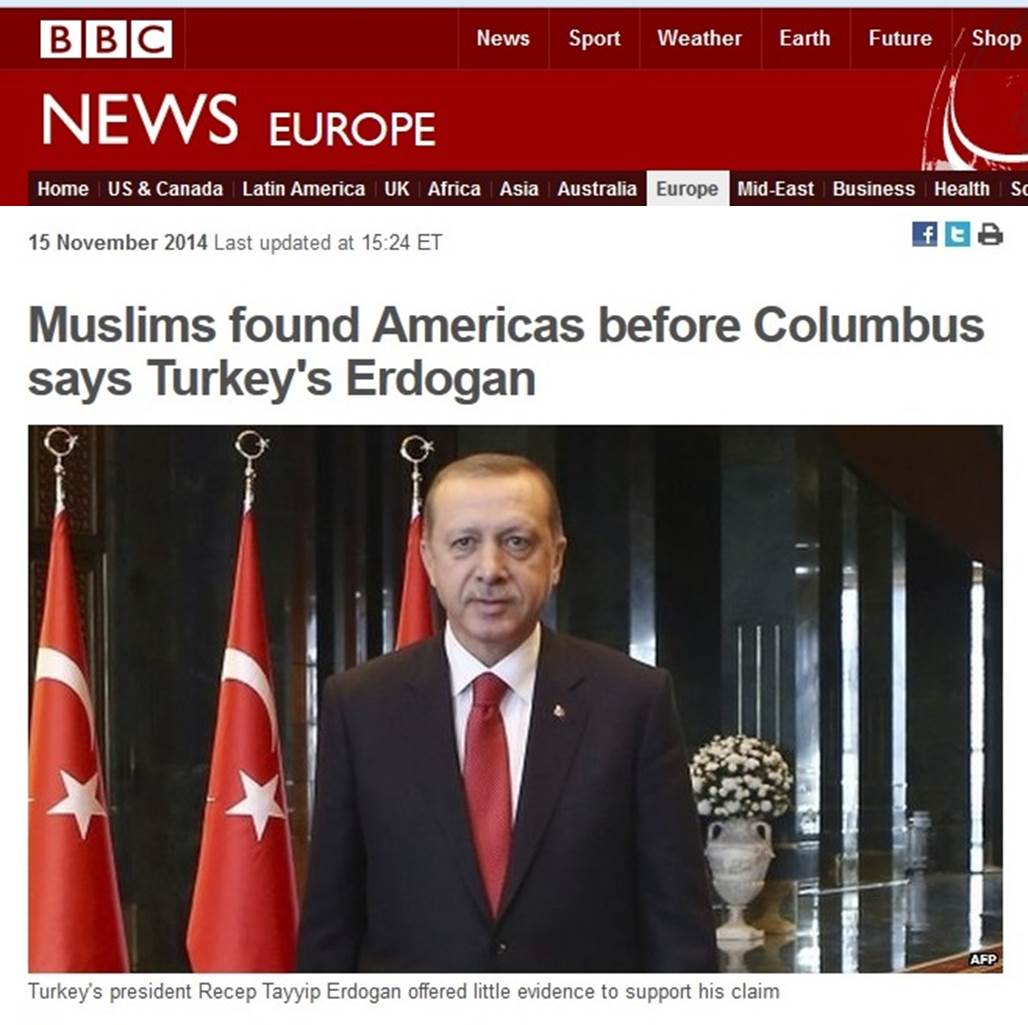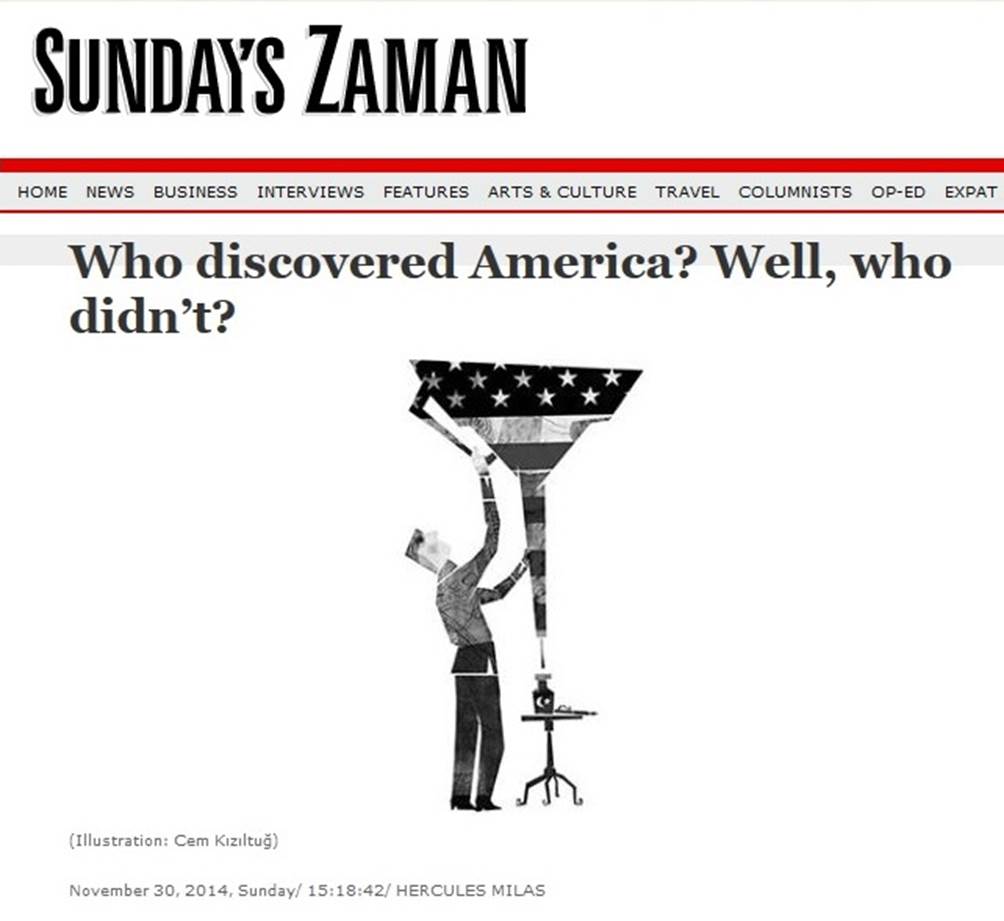 Just thirteen days after my Dispatch column and supplementary blog post discussing claims of Pre-Columbian Muslims in America appeared, Turkish President Recep Tayyip Erdogan made the startling announcement that “Muslims discovered America in 1178, not Christopher Columbus.” After reading the article I quipped to a colleague, it’s like he didn’t even read my Dispatch column! Erdogan received some predictable criticism for his views. For example, the Guardian reported that his claim was “mocked by some prominent columnists in the Turkish media. Mehmet Yilmaz, of the Hurriyet newspaper, suggested that Erdogans next claim should be that a Muslim, rather than Isaac Newton, discovered gravity.” Refusing to back down, Erdogan responded by saying that some unspecified but “very respected scientists in Turkey and in the world” supported the claim. He suggested that scholars who doubted it did so out of ignorance of Muslim cultural achievements or because of anti-Muslim sentiment: “they still do not believe a Muslim can achieve this”
Just thirteen days after my Dispatch column and supplementary blog post discussing claims of Pre-Columbian Muslims in America appeared, Turkish President Recep Tayyip Erdogan made the startling announcement that “Muslims discovered America in 1178, not Christopher Columbus.” After reading the article I quipped to a colleague, it’s like he didn’t even read my Dispatch column! Erdogan received some predictable criticism for his views. For example, the Guardian reported that his claim was “mocked by some prominent columnists in the Turkish media. Mehmet Yilmaz, of the Hurriyet newspaper, suggested that Erdogans next claim should be that a Muslim, rather than Isaac Newton, discovered gravity.” Refusing to back down, Erdogan responded by saying that some unspecified but “very respected scientists in Turkey and in the world” supported the claim. He suggested that scholars who doubted it did so out of ignorance of Muslim cultural achievements or because of anti-Muslim sentiment: “they still do not believe a Muslim can achieve this”  Hercules Milas, writing in the November 30th issue of Sunday’s Zaman, identifies two dimensions that help to explain why Erdogan, or anyone, would wish to appropriate the so-called discovery of America by re-writing history: “One is about identity: People tend to glorify the source they built their identity on. The second is about insecurity. If people feel insecure, then they try to present their true or imagined past as superior to others. And it is not hard to create an imagined past.” It is unfortunate that President Erdogan is promoting an unsubstantiated view of history from his position as a head of state. Milas argues that the real problem, however, “is to make sure that such personal and subjective views are not turned into national dogmas taught at schools” — because that’s when an imagined past can acquire a dangerous momentum. Richard Francaviglia, the author of the paper on which my original column and post were based, fears that this particular imagined past is being used to provide an ideological foundation for efforts by the Islamic State to establish a worldwide caliphate.
Hercules Milas, writing in the November 30th issue of Sunday’s Zaman, identifies two dimensions that help to explain why Erdogan, or anyone, would wish to appropriate the so-called discovery of America by re-writing history: “One is about identity: People tend to glorify the source they built their identity on. The second is about insecurity. If people feel insecure, then they try to present their true or imagined past as superior to others. And it is not hard to create an imagined past.” It is unfortunate that President Erdogan is promoting an unsubstantiated view of history from his position as a head of state. Milas argues that the real problem, however, “is to make sure that such personal and subjective views are not turned into national dogmas taught at schools” — because that’s when an imagined past can acquire a dangerous momentum. Richard Francaviglia, the author of the paper on which my original column and post were based, fears that this particular imagined past is being used to provide an ideological foundation for efforts by the Islamic State to establish a worldwide caliphate.  All of this is why Earle Havens, curator of the new exhibit on Fakes, Lies, and Forgeries at the George Peabody Library, reminds us that “there’s never been a time in the history of the world when its been more important for students to understand that they cant trust everything they read.” This is a big reason why I bother to write posts like this one.
All of this is why Earle Havens, curator of the new exhibit on Fakes, Lies, and Forgeries at the George Peabody Library, reminds us that “there’s never been a time in the history of the world when its been more important for students to understand that they cant trust everything they read.” This is a big reason why I bother to write posts like this one.
Brad Lepper